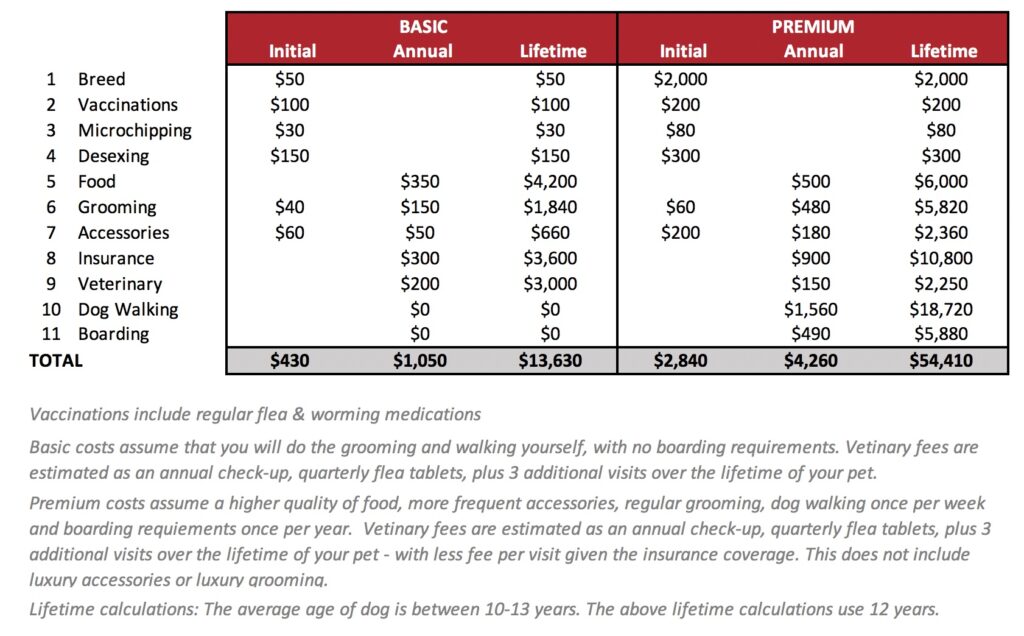Unfortunately, cuteness comes at a cost
Ok, so you’ve decided that you do want that doggie in the window. But is your heart ruling your head? Have you really looked into the cost of expanding your family?
There are many reasons why you might decide to get a pet. The main reasons are usually companionship, teaching kids about responsibility, relaxation and security. Most of us fall in love with those cute puppy dog eyes and rarely think about our hip pockets.
11 costs you need to consider before owning a dog
The costs of welcoming a new dog into your family can add up. We’ve calculated it for you including these 11 costs…
- Breed
- Vaccinations
- Microchipping
- Neutering / Desexing
- Food
- Grooming
- Accessories
- Insurance
- Vet Bills
- Dog Walking
- Boarding
All costs below are approximate US$ – convert to your currency as required.
1. Breed Type
These upfront costs depend on the type of breed and obviously, where you get it from. Puppies can cost as little as $50 from someone selling their mixed-breed litter on a classified site, to a few thousand dollars if you go to a top breeder and get yourself a pedigree puppy. Even more if you want a fancy cross-breed like a “labradoodle” or a “cockapoo”.
Read about how to choose the right breed for you here.
2. Vaccinations
All Puppies need to be vaccinated to protect them against a variety of diseases that they are susceptible to. Expect to pay anywhere up to $200 for initial vaccinations, depending on the size and breed of your puppy.
3. Microchipping
Most countries now require that your pet has to be registered with your local council, which usually means that it will need to be microchipped. In some places this is compulsory, and many breeders / pet shops have already done this for you and included it in the buying cost. However, if you buy from someone advertising through a classified website or local newspaper, you will have to take your new puppy to your local vet to be microchipped. Fees are around $50.
4. Neutering / Desexing
This is really recommended if you don’t want unplanned puppies on your lap! If you get a registered pedigree puppy, your breeder will likely stipulate that you have this done. Even if that is not the case, part of being a responsible fur-parent is ensuring that you are not producing unwanted puppy’s in the future. Depending on the sex and size of your dog, you’ll be looking between $150 to $300 to have this done.
5. Food
Feeding your new dog will be the biggest ongoing cost you’ll have to cover. Obviously the bigger the dog, the bigger the bill. On average, your looking around $350 to $500 per year. If you need specialised food or prefer premium products, this is likely to be more.
6. Grooming
Allow $40 to get a basic grooming kit, some dog friendly shampoo (remember your dogs skin is far more sensitive than yours, so you can’t use human shampoo). Depending on the breed you may need a regular visit to your vet or your groomer for de-shedding, coat thinning and nail clipping. Not to mention any specialty styling or if once a year you want to pamper your pouch on its birthday. This can be anywhere from $10 to $150 per visit so pamper with care!
7. Accessories
This is the fun bit, but even if you are on a budget, there are a few basics to keep your puppy happy at home and on the go. Within the first two years you will need a couple of different collars and leads as your puppy grows to be full size. A crate for sleeping and travelling and/or bed at home, food and water bowls and a constant selection of toys as pup will eventually chew them to destruction. Expect to pay between $60 to $200 to get started and then at least $50 per year. This is just for the basics – however, if you are planning to spoil your new Furbubba with toys, outfits and added creature comforts, then you will need to adjust this according to your tastes.
8. Insurance
Before we get to veterinary costs, we should discuss pet insurance! There are two schools of thought here. You either jump in and sign up with an insurer, giving you peace of mind that if anything happened you will have some support to manage unexpected costs. Or alternatively you look after your dog really well, keep it fit, healthy and loved, and there’s every chance that you’ll only ever need to visit the vet for regular booster shots and worming tables etc.
And the dog breed you choose may have a history of, or be susceptible to particular medical conditions. Or perhaps they are just super active or accident prone and then it could cost you a small fortune in veterinary bills. The challenge is that accidents can and do happen, so you have to weigh up the risks.
Insurance premiums can vary depending on breed between $25 to $75 per month. Many increase fees as your best friend reaches their twilight years, and a lot of providers won’t cover dogs over 7 or 8 years old. Be careful to compare and understand what’s covered.
If you are not opting for insurance, you may want to set aside a small amount of money every month for that rainy day. At least then it’s not so painful when something unexpected does happen.
9. Vet Bills
Starting with the basics, you should allow for at least one annual health check. Studies show that early detection can be life-saving and that your pet is more likely to get sick if you don’t visit a veterinarian at least annually. Remember our furry friends age quicker than we do, so skipping an annual visit to the vet is like you not visiting the doctor for more than 5 years.
To cover just the regular yearly check-ups, and quarterly worm tablets etc, you are looking around $200 to $300. Flea and worming medications – AUD$90 per quarter.
And that’s not allowing for any unexpected vet visits.
10. Dog Walking
If there are going to be times that you can’t be there to walk your dog, there are a growing number of dog walking services available to provide your furbubba with regular exercise. Expect to pay around $20 – $30 per hour. Many will also provide doggy day-care or pet sitting services for overnight stays.
11. Boarding
There may be times that you need to go away for work or you’re having a family holiday. If you’re not taking your dog with and you and don’t have a close family friend that will look after your dog whilst your away, you will need a boarding kennel. Expect to pay around $25 to $50 per night depending on the time of year and the type of kennel.
and the yearly average cost is…
are you sitting
comfortably for this?
Your initial outlay will be between $430 and $2,840 depending on breed.
Your annual costs will total between $1,050 for basic requirements through to $4,260 for more premium options.
The average dog will live between 10 to 13 years old. So, if we look at an average lifetime of 12 years, that totals anywhere between $13,000 and $54,000!

It is important to make sure you can afford this commitment to bring a new puppy into your family, as it is a lot of money. However, it’s a small price to pay when you discover all the health benefits, fun and love you get in return over those years.
Who says money can’t buy you love! With a dog by your side it certainly can.
